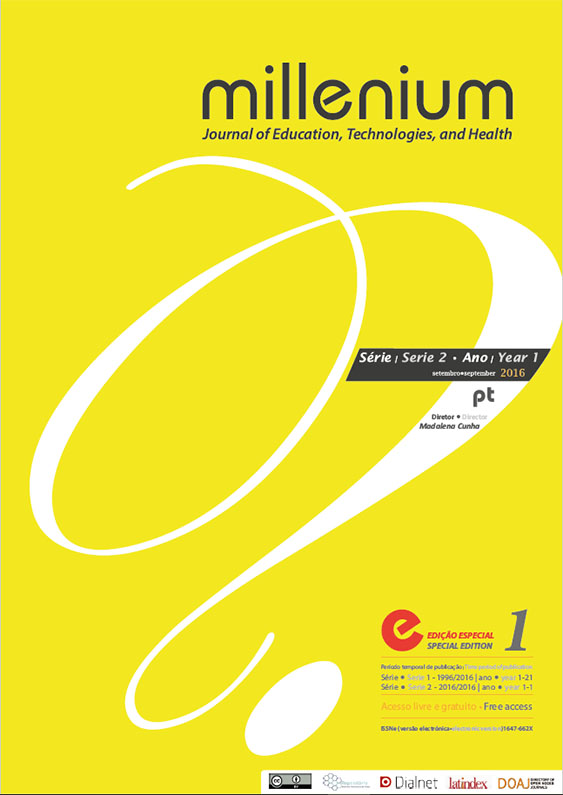The Lived Experience of Addicts Women in Postpartum Period
Keywords:
Women, Addition, Maternity, PhenomenologyAbstract
Introduction: Motherhood is one of the most striking events is critical in the lives of women. More or less desirable, more or less planned, be a mother is of such particularity that health professionals should be especially attentive.
Methods: We performed a phenomenological and interpretative study. The participants were selected intentionally. Held 14 phenomenological interviews with an unstructured approach. We use procedural assumptions of Van Manen (1990) for data analysis.
Results: The findings indicate to us that the women participating in our study percecionam intentional ability to care for their children, associating a strong connection and attachment to their children, making them feel as mothers. If the past life history is still very present in these women, there is as a need to forget it, allowing them to have the ability to project themselves in the future. Referring often the social stigma they carry in relation to the ability to be ‘good’ mothers, these women seem to yearn for greater support either by professionals or by the institutions.
Conclusions: We conclude that seems to be determining the development of support programs and intervention projects with these women, with a view to rehabilitation and training.
Downloads
References
Bjørg H., Morten, L., & Elin R. (2007). Substance abuse in pregnant women: Experiences from a special child welfare clinic in Norway. BMC Public Health, 7(322). doi:10.1186/1471-2458-7-322
Canavarro, M. (2001). Gravidez e maternidade: Representações e tarefas de desenvolvimento. In M. Canavarro (Ed.), Psicologia da gravidez e da maternidade (pp. 17-49). Coimbra: Quarteto Editora.
Dilthey, W. (1989). Introduction to the human sciences: An attempt to lay a foundation for the study of society and history. Detroit: Wayne State University Press.
Fernandes, R., & Narchi, N. (2007). Enfermagem e saúde da mulher. São Paulo: Editora Manole.
Frankl, V. (1987). Em busca de sentido: Um psicólogo no campo de concentração. Porto Alegre: Sulina
Frazão, C., Pereira, E., Teles, L., & Amaro, F. (2001). Mulher toxicodependente e o planeamento familiar, a gravidez e a maternidade. Lisboa: Fundação Nossa Srª Bom Sucesso.
Heidegger, M. (2005). Ser e tempo. Petrópolis, Rio de Janeiro: Editora Vozes.
Henriques, C., Botelho, M., Henriques, M., & Vaz, D. (2015). Systematic review of experiences into motherhood transition felt by women undergoing substance abuse treatment. Mitteilungen Klosterneuburg, 65(1), 396-411.
Henriques, C., Botelho, M., & Catarino, H. (2015). Transition to the maternal role in women with addiction problems to psychoactive substances: Conceptual Map. International Journal of Nursing, 2(2), 1-9 doi: 10.15640/ijn.v2n2a1
International Council of Nurses (2012). Women’s health: ICN Position. Acedido em http://www.icn.ch/images/stories/documents/publications/position_statements/A19_Womens_Health.pdf
Lewis, C. S. (1986). Os quatro amores (2ª ed.). São Paulo, Brasil: Mundo Cristão.
Lopes, J. M. O. (2012). Ser cuidado por um enfermeiro gestor de caso: A experiencia vivida da pessoa com problemas de adição (Tese de doutoramento, Universidade de Lisboa). Acedido em http://hdl.handle.net/10451/7296
Meleis, A. (2011). Theoretical nursing: Development and progress. Philadelphia, PA: Williams & Wilkins.
Meleis, A., Sawyer, L., Im, E., Messias, D., & Schumacher, K. (2000). Experiencing transitions: An emerging middle range theory. Advances in Nursing Science, 23(1), 12-28.
Mercer, R. (2004). Becoming a mother versus maternal role attainment. Journal of Nursing Scholarship, 36(3), 226-232.
Mercer, R., & Walker, L. (2006). A review of nursing interventions to foster becoming a mother. Journal of Obstetric, Gynecologic, and Neonatal Nursing, 35, 568–582.
Monteiro, R. (2005). O que dizem as mães: Mulheres trabalhadoras e suas experiências. Coimbra: Quarteto Editora.
Parratt, J., & Fahy, K. (2011). A feminist critique of foundational nursing research and theory on transition to motherhood.
Midwifery, 27(4), 445–451. doi:http://dx.doi.org/10.1016/j.midw.2010.02.012
Parse, R. (1998). The human becoming school of thought. California: Thousand Oaks.
Radcliffe, P. (2011). Motherhood, pregnancy, and the negotiation of identity: The moral career of drug treatment. Social Science & Medicine, 72, 984-991.
Rosa, A., Gomes, J., & Carvalho, M. (2000). Toxicodependência: Arte de cuidar. Coimbra: Formasau.
Soares, H. M. (2008). O acompanhamento da família no seu processo de adaptação e exercício da parentalidade: Intervenção de enfermagem (Dissertação de mestrado, Universidade do Porto). Acedido em http://hdl.handle.net/10216/7175
Van Manen, M. (1990). Researching lived experience: Researching lived experience, human science for an action sensitive pedagogy. New York: State University of New York Press.
Watson, J. (2002). Enfermagem: Ciência humana e cuidar: Uma teoria de enfermagem. Loures: Lusociência.
Downloads
How to Cite
Issue
Section
License
Authors who submit proposals for this journal agree to the following terms:
a) Articles are published under the Licença Creative Commons (CC BY 4.0), in full open-access, without any cost or fees of any kind to the author or the reader;
b) The authors retain copyright and grant the journal right of first publication, allowing the free sharing of work, provided it is correctly attributed the authorship and initial publication in this journal;
c) The authors are permitted to take on additional contracts separately for non-exclusive distribution of the version of the work published in this journal (eg, post it to an institutional repository or as a book), with an acknowledgment of its initial publication in this journal;
d) Authors are permitted and encouraged to publish and distribute their work online (eg, in institutional repositories or on their website) as it can lead to productive exchanges, as well as increase the impact and citation of published work
Documents required for submission
Article template (Editable format)





